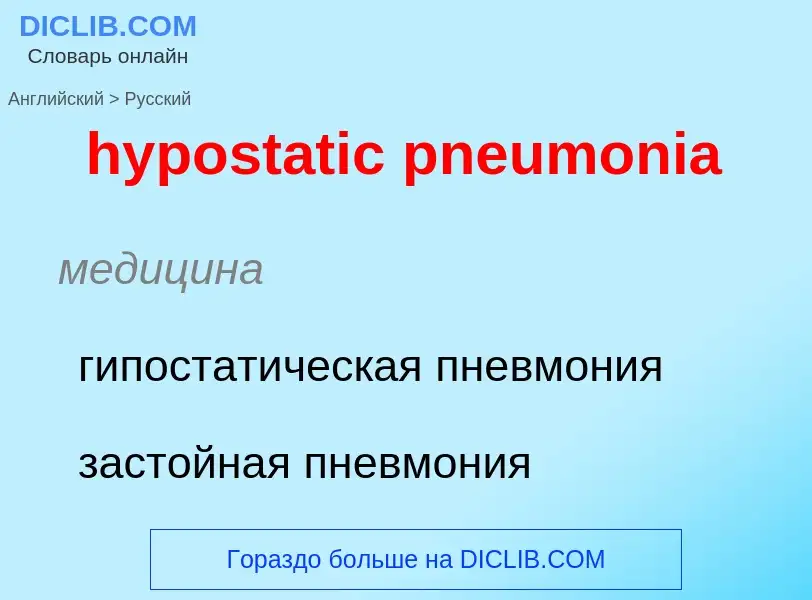Traducción y análisis de palabras por inteligencia artificial ChatGPT
En esta página puede obtener un análisis detallado de una palabra o frase, producido utilizando la mejor tecnología de inteligencia artificial hasta la fecha:
- cómo se usa la palabra
- frecuencia de uso
- se utiliza con más frecuencia en el habla oral o escrita
- opciones de traducción
- ejemplos de uso (varias frases con traducción)
- etimología
hypostatic pneumonia - traducción al ruso
медицина
гипостатическая пневмония
застойная пневмония
медицина
внутриутробная (врождённая) пневмония
Definición
Wikipedia

Pneumonia is an inflammatory condition of the lung primarily affecting the small air sacs known as alveoli. Symptoms typically include some combination of productive or dry cough, chest pain, fever, and difficulty breathing. The severity of the condition is variable.
Pneumonia is usually caused by infection with viruses or bacteria, and less commonly by other microorganisms. Identifying the responsible pathogen can be difficult. Diagnosis is often based on symptoms and physical examination. Chest X-rays, blood tests, and culture of the sputum may help confirm the diagnosis. The disease may be classified by where it was acquired, such as community- or hospital-acquired or healthcare-associated pneumonia.
Risk factors for pneumonia include cystic fibrosis, chronic obstructive pulmonary disease (COPD), sickle cell disease, asthma, diabetes, heart failure, a history of smoking, a poor ability to cough (such as following a stroke), and a weak immune system.
Vaccines to prevent certain types of pneumonia (such as those caused by Streptococcus pneumoniae bacteria, linked to influenza, or linked to COVID-19) are available. Other methods of prevention include hand washing to prevent infection, not smoking, and social distancing.
Treatment depends on the underlying cause. Pneumonia believed to be due to bacteria is treated with antibiotics. If the pneumonia is severe, the affected person is generally hospitalized. Oxygen therapy may be used if oxygen levels are low.
Each year, pneumonia affects about 450 million people globally (7% of the population) and results in about 4 million deaths. With the introduction of antibiotics and vaccines in the 20th century, survival has greatly improved. Nevertheless, pneumonia remains a leading cause of death in developing countries, and also among the very old, the very young, and the chronically ill. Pneumonia often shortens the period of suffering among those already close to death and has thus been called "the old man's friend".




![alveoli]] with fluid, hindering oxygenation. The alveolus on the left is normal, whereas the one on the right is full of fluid from pneumonia. alveoli]] with fluid, hindering oxygenation. The alveolus on the left is normal, whereas the one on the right is full of fluid from pneumonia.](https://commons.wikimedia.org/wiki/Special:FilePath/New Pneumonia cartoon.jpg?width=200)
![A [[pleural effusion]]: as seen on chest X-ray. The A arrow indicates fluid layering in the right chest. The B arrow indicates the width of the right lung. The volume of the lung is reduced because of the collection of fluid around the lung. A [[pleural effusion]]: as seen on chest X-ray. The A arrow indicates fluid layering in the right chest. The B arrow indicates the width of the right lung. The volume of the lung is reduced because of the collection of fluid around the lung.](https://commons.wikimedia.org/wiki/Special:FilePath/Pleural effusion.jpg?width=200)
![SARS]] SARS]]](https://commons.wikimedia.org/wiki/Special:FilePath/SARS xray.jpg?width=200)
![The bacterium ''[[Streptococcus pneumoniae]]'', a common cause of pneumonia, imaged by an [[electron microscope]] The bacterium ''[[Streptococcus pneumoniae]]'', a common cause of pneumonia, imaged by an [[electron microscope]]](https://commons.wikimedia.org/wiki/Special:FilePath/Streptococcus pneumoniae.jpg?width=200)
![WPA]] poster, 1936/1937 WPA]] poster, 1936/1937](https://commons.wikimedia.org/wiki/Special:FilePath/WPA Pneumonia Poster.jpg?width=200)



